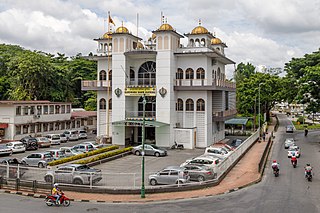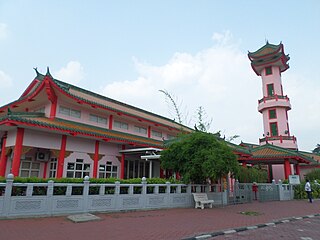
Perak is a state of Malaysia on the west coast of the Malay Peninsula. Perak has land borders with the Malaysian states of Kedah to the north, Penang to the northwest, Kelantan and Pahang to the east, and Selangor to the south. Thailand's Yala and Narathiwat provinces both lie to the northeast. Perak's capital city, Ipoh, was known historically for its tin-mining activities until the price of the metal dropped, severely affecting the state's economy. The royal capital remains Kuala Kangsar, where the palace of the Sultan of Perak is located. As of 2018, the state's population was 2,500,000. Perak has diverse tropical rainforests and an equatorial climate. The state's main mountain ranges are composed of the Titiwangsa, Bintang and Keledang Ranges, where all of them are part of the larger Tenasserim Hills system that connects Myanmar, Thailand and Malaysia.

Ipoh is the capital city of the Malaysian state of Perak. Located by the Kinta River, it is nearly 200 km (120 mi) north of Kuala Lumpur and 150 km (93 mi) southeast of George Town in neighbouring Penang. As of the 2020 census Ipoh had a population of 759,952, making it the eighth-largest city in Malaysia by population.

James Wheeler Woodford Birch, commonly known as J. W. W. Birch was a British colonial official who was assassinated in the Malay state of Perak in 1875, an event that led to the outbreak of the Perak War and ultimately to the extension of British political influence over the Malay Peninsula.

Taiping is a town located in Larut, Matang and Selama District, Perak, Malaysia. It is located approximately 48 km (30 mi) northwest of Ipoh, the capital of Perak, and 78 km (48 mi) southeast of George Town, Penang. With a population of 245,182, it is the second largest town in Perak after Ipoh, the state capital.
Teluk Intan is a town in Hilir Perak District, Perak, Malaysia. It is the district capital, the largest town in the district and fourth largest town in the state of Perak with an estimated population of around 172,505, more than half of Hilir Perak district's total population (232,900).

Kellie's Castle is a castle located in Batu Gajah, Kinta District, Perak, Malaysia. The unfinished, ruined mansion, was built by a Scottish planter named William Kellie-Smith. According to differing accounts, it was either a gift for his wife or a home for his son. Kellie's Castle is situated beside the Raya River, which is a small creek to the Kinta River.

Tapah Road is a small town in Batang Padang District, Perak, Malaysia. The population consists of 40% Muslim Malays, 30% Chinese, 20% Indians and a few indigenous.
Pusing is a small town in Kinta District, Perak, Malaysia. It is located in the western part of Perak, approximately 18 kilometers southeast of Ipoh, the state capital. It is surrounded by scenic landscapes and is known for its lush greenery.

Dato' Ngeh Koo Ham, also known as James Ngeh, is a Malaysian politician, advocate and solicitor who has served as the Member of Parliament (MP) for Beruas since March 2008. He served as Speaker of the Perak State Legislative Assembly from July 2018 to May 2020, Member of the Perak State Executive Council (EXCO) in the Pakatan Rakyat (PR) administration under former Menteri Besar Mohammad Nizar Jamaluddin from March 2008 to the collapse of the PR administration in February 2009 and Member of the Assembly (MLA) for Sitiawan from March 2004 to May 2018. He is a member of the Democratic Action Party (DAP), a component party of the Pakatan Harapan (PH) and formerly PR, Barisan Alternatif (BA) and Gagasan Rakyat (GR) coalitions. He was also Deputy Secretary-General of DAP, Member of the Central Executive Committee (CEC) of DAP and State Chairman of DAP of Perak.
Sunway City Ipoh is a township in Ipoh, Perak, Malaysia. It is located in Tambun. Some of the famous attractions are Lost World of Tambun and The Banjaran Hotspring. Original development include the Alphine village (condominions), Garden Villars, Lakeside Villas (linked-houses), Country Homes (bungalows), Lakeside Mansion (bungalows), Montbleu Residence and Serene Villa. The developer also built the Extreme Park, a golf driving range, the Banjaran Hotspring Retreat (hotel), the Lost World Hotel right next to the Lost World of Tambun, Sunway Bayu and Sunway Onsen.
The Taiping Clubs were sports and recreation clubs that existed in the city of Taiping, Malaysia, during the 1880s. At the time, the city saw significant growth in European as well as Chinese, Indian, Arab, and Indonesian communities, and thus the need for such clubs arose. The following is a non-exhaustive list of these establishments.
Leong Sin Nam, alias Leong Sin, Leung Sin, Leong Sin Hee, was a Malaysian businessman. He migrated and settled in British Malaya in 1898. From humble beginnings, he worked hard to become a wealthy tin mine owner in Perak. He was a businessman, an active community leader and a philanthropist. He was a Chinese revolutionary with similar aspirations as Sun Yat-sen and a strong supporter of the Chinese war efforts during the Sino-Japanese war.
Richard James Wilkinson was a British colonial administrator, scholar of Malay, and historian. The son of a British consul, Richard James Wilkinson was born in 1867 in Salonika (Thessaloniki) in the Ottoman Empire. He studied at Felsted School and was an undergraduate of Trinity College, Cambridge. He was multilingual and had a command of French, German, Greek, Italian and Spanish, and later, Malay and Hokkien which he qualified in, in 1889, while a cadet after joining the Straits Settlements Civil Service. He was an important contributor to the Journal of the Malayan Branch of the Royal Asiatic Society (JMBRAS). On 7 November 1900 Wilkinson presented a collection of Malay manuscripts and printed books to the University of Cambridge Library. He was appointed CMG in 1912.

The Ipoh railway station is a Malaysian train station located on the southwestern side of and named after the capital city of Ipoh, Perak. It serves as the main railway terminal for the state under Keretapi Tanah Melayu offering KTM ETS services, as well as handling freight trains. Although there are nine tracks, only four are electrified and three of the electrified tracks are used for the ETS service. The remaining six other tracks are used for freight trains.

Malaysian Sikhs are known to be the fourth largest Malaysian Indian ethnic group. It is estimated that there are around 100,000 Sikhs in Malaysia.

Sultan Azlan Muhibbuddin Shah ibni Almarhum Sultan Yussuff Izzuddin Shah Ghafarullahu-lah was Sultan of Perak from 1984 until his death in 2014, the ninth Yang di-Pertuan Agong, from 1989 to 1994 and the 5th Lord President of the Supreme Court, from 1982 to 1984.

Arthur Benison Hubback was British Army officer and architect who designed several important buildings in British Malaya, in both Indo-Saracenic architecture and European "Wrenaissance" styles. Major works credited to him include Kuala Lumpur railway station, Ubudiah Mosque, Jamek Mosque, National Textile Museum, Panggung Bandaraya DBKL, Ipoh railway station, and Kowloon railway station.

Jamek Mosque, officially Sultan Abdul Samad Jamek Mosque is one of the oldest mosques in Kuala Lumpur, Malaysia. It is located at the confluence of the Klang and Gombak rivers and may be accessed via Jalan Tun Perak. The mosque was designed by British architect and soldier Arthur Benison Hubback, and built in 1909. It was the principal mosque of Kuala Lumpur until the construction of the national mosque Masjid Negara in 1965.
Buntong is a suburb of Ipoh, Perak, Malaysia. Buntong is one of the largest residential areas in the city of Ipoh. Buntong is popular for Kampung Kacang Puteh, a major industrial hub for producing famous Indian bites like sweets and murukku.

The Muhammadiah Mosque is a mosque in Ipoh, Kinta District, Perak, Malaysia.












